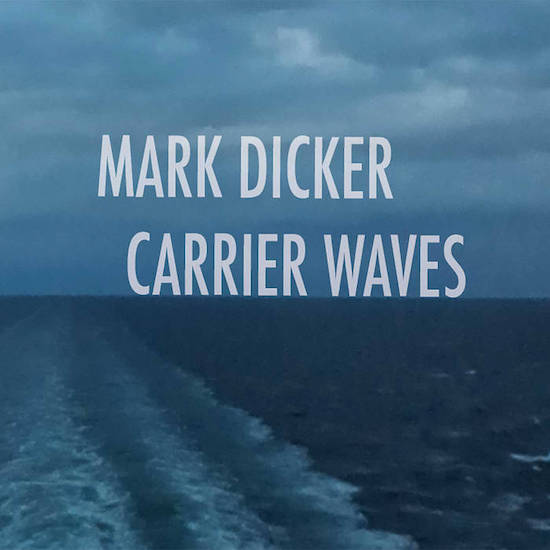I’ve been listening to Mark Dicker’s prior projects and bands (I was fairly unfamiliar with his work before taking on this review) as a reference point for this write-up. I wanted to understand the mindset behind the otherworldly, gooey tape manipulations found on his new solo album Carrier Waves and connect it to Dicker’s roles in his past bands.
Trencher, a “casio-grindcore” project that formed in the early 00s in which Dicker played keyboards and provided vocals, seems to get lumped in with much of the spastic and unhinged math rock of bands like The Locus in its descriptions. While the band does seem to employ a supremely fast and chaotic approach to revoltingly angular rock n’ roll, there also seems to be an element of the bizarre and unnerving in the band’s sound that might repel the kind of screamo bros who often listen to that kind of music.
Dicker joined the menacingly blackened doom metal South Londoners Palehorse in time for one of the band’s most pulverizing and disgusting albums, 2013’s Harm Starts Here, and the band infinitely benefitted from the addition of Dicker’s power electronics to the band’s previously dual bass and drums attack, “a whole other, more frightening texture invaded their sound,” observed The Quietus scribe Toby Cook in his Columnus Metallicus write-up.
The key word from that description would seem to be “other.” In his heavier, and more rock-oriented projects, Dicker brought those bands a sense of otherworldly alterity and extraterrestrial disorientation. By infusing these familiarly heavy bands with the sonics of an unfamiliar realm, Dicker deftly sublimated the strange and alienating within the familiar context of touring rock units.
The relationship was reciprocal: Dicker got to ground his work within a more popular, rockist context, and the bands were able to individuate and stand apart as radical and interesting in comparison with much of their counterparts. But on Dicker’s solo albums, such as the new Carrier Waves, the alien sounds have taken centre stage, emerging from the chaos of their hosts’ bodies as a science-fiction other – a kind of xenomorph – of electronic sound.
Carrier Waves comes on the heels of the Grand Hotel Ibis cassette tape that Dicker released in collaboration with none other than tQ editor John Doran for their project SELF-HELP. While that album benefitted from an overwhelming spew of bass-oriented hypnotic sound and Doran’s deliriously observational spoken word lyrics, Carrier Waves is muted and stripped back. It’s less heavy, but certainly no less unnerving. While SELF-HELP is grounded in the chaos of liquid modern existence, Carrier Waves sounds like it comes from a Lovecraftian space beyond the reaches of human understanding.
Indeed, Dicker’s hybrid of visceral drones, confused electronics, unnervingly manipulated vocals and fractured field recordings (typically compiled on the go by Dicker via his iPhone) yield an image of a man driven to the brink of insanity by an obsession for capturing the outside: he’s in a trailer somewhere in a New Mexican desert, clothed in underpants and a sweat stained robe, tinkering with radios and antennas, channeling in sounds from an extraterrestrial planet desperate for signs that there is something else out there.
Anything.
The dark “sci-fi-ness” of it all becomes emblematic of a kind of cosmic alienation and loneliness. Most people who get lost searching for something out there are seldom happy with what they have here, this music suggests.
On the album’s best track ‘Hairy FM,’ a cluster of wobbly indecipherable vocal sounds and eerie drones give way for a pulsating, synthetic beat that slowly is enveloped in bizarre, alien voices and a swirl of laser-y field recordings and electronic sounds. It’s simultaneously dread-inducing and head bobbing, like it’s lulling you into relaxation for the abduction that you’ve been pining for. Be careful what you pine for.
‘Accretion Disco’ envelopes several disparate modulated transmissions into a solitary unit of sensorially overwhelming sound, volume moving up and down suspending the listener in a state of unease and suspicion. The eight minute-plus ‘Jocelyn Probes Space 2’ is guided by a set of low-end drones with sporadic electronic flourishes placed throughout generating the sense of waiting for something that never arrives, a fitting metaphor for the world we inhabit. The closer, ‘Final Identifier,’ takes on a more positive tone with its blissed out synths that leaves the album’s blurry narrative open to interpretation: we don’t know what comes next, but it will come nonetheless.
When dealing with the kinds of dizzyingly uncanny electronic sounds practiced by Dicker, it’s hard not to make room for comparisons to Leyland James Kirby, but Dicker’s approach seems to carve out its own space in this lane. Whereas the uncanniness in Kirby’s sounds comes from its critique of nostalgia in late modernity, the “temporal loop” of society and culture endlessly repeating itself, Dicker seems more interested with the realm beyond our culture and beyond our understanding. His work stems more from Eugene Thacker than it does Mark Fisher. It stimulates the imagination and allows us to open our brain to thinking beyond our lives and beyond our system.
I found it calming in a way, listening to Carrier Waves during the time of the societal upheaval and mass confusion associated with the outbreak of the coronavirus. We are literally living through a time that could mark the true end of history; Dicker allows us to think beyond and disconnect from that history, its culture, our world, and connect to a world beyond.


